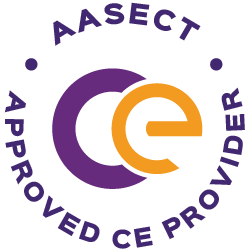Sex coaching can be an energetically demanding career. Fortunately, you’ve put in your training to address this: you practice extreme self-care, you set appropriate boundaries, and you maintain a lifestyle that supports your general well-being. You’re accustomed to looking after your own energetic needs. But have you noticed something odd?
During this pandemic, you may feel more drained than ever after your client appointments. Even when you were seeing people in office, showing up to meet with them was less exhausting. How is that possible?
Even though it’s counter-intuitive, there’s real science behind why virtual meetings can be more taxing on your brain than their face-to-face counterparts.
What is “Zoom Fatigue?”
Zoom fatigue happens when our brains experience the cognitive dissonance virtual meetings can cause.
When it comes to the typical conversation, we’re doing much more than speaking. “Humans communicate even when they’re quiet,” says Julia Sklar of National Geographic. “During an in-person conversation, the brain focuses partly on the words being spoken, but it also derives additional meaning from dozens of non-verbal cues, such as whether someone is facing you or slightly turned away, if they’re fidgeting while you talk, or if they inhale quickly in preparation to interrupt.”
Imagine you’re in a Zoom meeting with a group of other sex coaches. When you see a face and hear a voice, you classify that as an interaction. However, when your brain notices key differences in this virtual interaction, it begins to wonder: Where’s the body language? Where are all of the non-verbal cues? Where’s the subtlety in facial expression and breathing?
If you normally rely on these kinds of unspoken clues to thrive in a face-to-face conversation, then your brain has to work much harder to hold its own in a virtual conversation. The result is deep exhaustion that seems to come out of nowhere, and perhaps a much lower tolerance for video conferencing.
How can sex coaches address and manage the effects?

Photo by Doğukan Şahin on Unsplash
To bolster your defenses against Zoom fatigue, it’s important to understand why you’re experiencing it.
According to communications experts at Eloqui, there are a few different reasons why this could happen to you. “Video calls require more focus than face-to-face meetings,” says this Eloqui blog post. “First, you’re fighting distractions—from emails, texts and websites, to external noise and activities including pets and children.” (By the way, if you are looking for the BEST speaker trainings in the world, Deborah Shames and her partner David Booth, founders of Eloqui are the top of their game! Think about getting specific public speaking coaching from these superstars!)
If you’re having trouble concentrating during your client sessions, team meetings, summits, and other virtual meet-ups, eliminate as many distractions as possible. Close unnecessary windows and tabs, silence your phone and put it in a drawer, and, if possible, find a way to keep your children and pets occupied.
Can you create a special, intimate space for video conferencing? An office or a separate room with the door closed is ideal; if that’s not possible, even a space sectioned off with a room divider can give you a sense of separation and help you focus. Maintain the energy of this space with your clear intentions: when you enter, tell yourself, When I’m here, I concentrate on the task at hand. Do your best to honor that promise to yourself.
Another Zoom energy drain might come from feeling self-conscious. Be honest: during a group video call, are you consistently watching the speaker, or do you find yourself sneaking peeks at your own face? If your answer was the latter, no worries—a lot of us do this!
“Because you’re on camera, usually in a close-up, you can’t help but check to see how you look and how you’re doing, instead of maintaining eye contact,” says Eloqui. “Plus, most of us don’t like being watched so closely. So we feel the need to perform rather than communicate.”
If you can relate, remember this simple trick: be mindful and present. It’s natural to want to focus on yourself when that’s an option, but that’s not the purpose of a conversation! When you find yourself more concerned with your hand gestures and facial expressions than what others on a call are saying, try to remind yourself why you’re there:
I’m here to actively listen to my client so I can help her face her concerns.
I’m here to inform this group about how they can safely explore kink at home.
I’m here to be in the presence of other professionals and gain as much as possible from this summit.
Diverting your focus away from judging yourself will free up your mental energy, allowing you to focus more fully on the people outside of you and make the most out of the conversation you’re having. And remember: your brain is wired to prioritize you, so don’t feel bad if you have to give yourself frequent reminders!
What are some other strategies against Zoom fatigue?

Photo by bruce mars on Unsplash
Apart from shifting your mindset around video conferencing, there are some things you can try to keep Zoom fatigue out of the picture:
Limit your Zoom time. This seems obvious, but many of us avoid this simple first step! Do you really need another team meeting, or would a thorough email suffice? Would some of your clients accept (or even prefer) an appointment over the phone rather than on video? If video meetings are unavoidable, consider efficiency: your weekly strategy meeting might be scheduled for an hour, but what if you did it in half that time? Working within constraints invites you to carefully consider what is and is not necessary to you.
Find other ways to scratch your social itch. If you’re like a lot of others out there, you’ve been using Zoom for more than work: it’s now the venue for your book club, your after-work happy hour, your yoga class, your deep-dive sexuality summit, your family reunion, and much more. You might assume that social fulfillment always requires the presence of others, but that’s not the case!
Have you experienced a deep, personal connection with someone you’ve never even met in person? Conversely, have you felt totally distant from a person sitting right next to you? This is because the feeling of connection happens in your brain. Instead of automatically turning to others to fulfill your social needs, try some alternatives: connect with characters in a good book, connect with yourself and your fantasies through masturbation, and mindfully meditate on the connections you have with others. Simply reflecting on the idea of a connection can satisfy your brain as much as a real meet-up, if not more!
Learn your video conferencing patterns, triggers, and behaviors. Pay attention to how you feel during and after a Zoom meeting and use that information to plan for success. How long can you be on a video call before your focus starts to wander? When do you start to notice strain in your eyes, neck, and back? How does the rest of your body feel? When was the last time you had a full day without any video conferencing? Be mindful of your own needs and take regular breaks, exercise, and decompress. Practice gratitude for the possibilities Zoom offers us, but plan tech-free days to restore yourself and prevent burnout.
Curious about training to become a Certified Sex Coach™? Join the next live Info Session to meet the SCU team and participate in a live Q&A!







